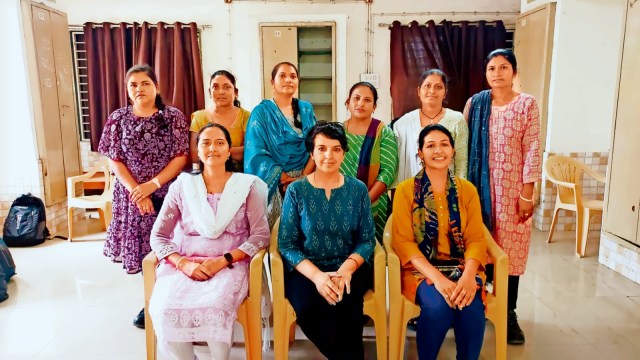Eight widows of martyrs and the story of their standing on own feet
To build her son's future and after having a fallout with her in-laws, Hetal started taking up various jobs to support herself. As a former NCC cadet, she even appeared for the Sashastra Seema Bal recruitment exam but was only met with disappointment.
 Some of the wives of martyrs at the DSWRO. Express photo
Some of the wives of martyrs at the DSWRO. Express photoHetal Pawar (35) had decided to not pursue a career and dedicate her life to raising her son despite having completed her BEd degree. However, tragedy struck when her husband from the RR 56 Maratha Regiment was martyred at Kupwara in Jammu and Kashmir at the age of 28 on January 19, 2011. Her son was only six months old at that time.
To build her son’s future and after having a fallout with her in-laws, Hetal started taking up various jobs to support herself. As a former NCC cadet, she even appeared for the Sashastra Seema Bal recruitment exam but was only met with disappointment. Her pleas to the Vadodara Municipal Corporation (VMC) to grant her a teaching job in a civic school also fell on deaf ears.
Hetal had almost lost hope until she received a call from the Vadodara District Sainik Welfare and Resettlement Office (DSWRO) regarding a job opportunity in a private company, as part of an initiative of the DSWRO to help ‘veerranis’ – widows of martyrs – to stand on their own feet.
She promptly accepted the offer around three months ago, prioritising the future of her son, now a Class IX student, who wants to pursue a career in the Army like his father.
Hetal now works at a workshop project of a Vadodara-based multinational corporation, as part of the company’s CSR initiative, in partnership with DSWRO. She is not the only one.
Seven other such widows have also been similarly rehabilitated. They are Veena Dalpatsinh Chavda, Geeta Baria, Dhanlakshmiben Solanki, Sangeeta Parmar, Premila Rathwa, Ranjeeta Rathwa, and Laxmi Baria.
Speaking to The Indian Express, DSWRO officer, Lt Col (Dr) Kamalpreet Saggi (retd), said that the wives of martyrs who died on the border while on duty, receive pension but their financial burden was much more.
 “The pension is inadequate. Most of these women are uneducated and have never stepped out of home… But now, with their children growing up, they are unable to meet the cost of education and family responsibilities. In these difficult times, the assistance provided to these eight Veernaris has helped them become self-sufficient,” he added.
“The pension is inadequate. Most of these women are uneducated and have never stepped out of home… But now, with their children growing up, they are unable to meet the cost of education and family responsibilities. In these difficult times, the assistance provided to these eight Veernaris has helped them become self-sufficient,” he added.
“From subsisting on the meagre monthly amounts, mainly from the pensions, the women are now earning up to Rs 22,000 per month and are able to imagine a better life for their children and themselves,” said Saggi.
Veena from Khandiya village in Godhra said, “My husband Dalpatsinh Chavda was martyred in 2021 while on duty at Sagar in Madhya Pradesh… Raising three children was challenging for a woman like me, who has only studied up to Class IV. The pension was insufficient, and I was constantly worried about the future of my children. However, thanks to the efforts of the DSWRO Vadodara, I finally secured a job in this company and achieved financial stability.”
Geeta, a BCom graduate from Chhota Udepur, is raising her children after the death of her husband Tulsi Baria, who was martyred at Udhampur. “My husband was martyred on March 10, 2022… I accepted the job like other veernaris and thank the DSWRO for this opportunity… I can now support my children. My daughter is studying in Class IX and wants to become an air hostess, my son, a student of Class V, is willing to join the Army,” she said.
With the success stories of the eight women, the DSWRO hopes to implement the project for 900 other widows of martyrs in its jurisdiction that extends to Anand, Kheda and Chhota Udepur districts.







